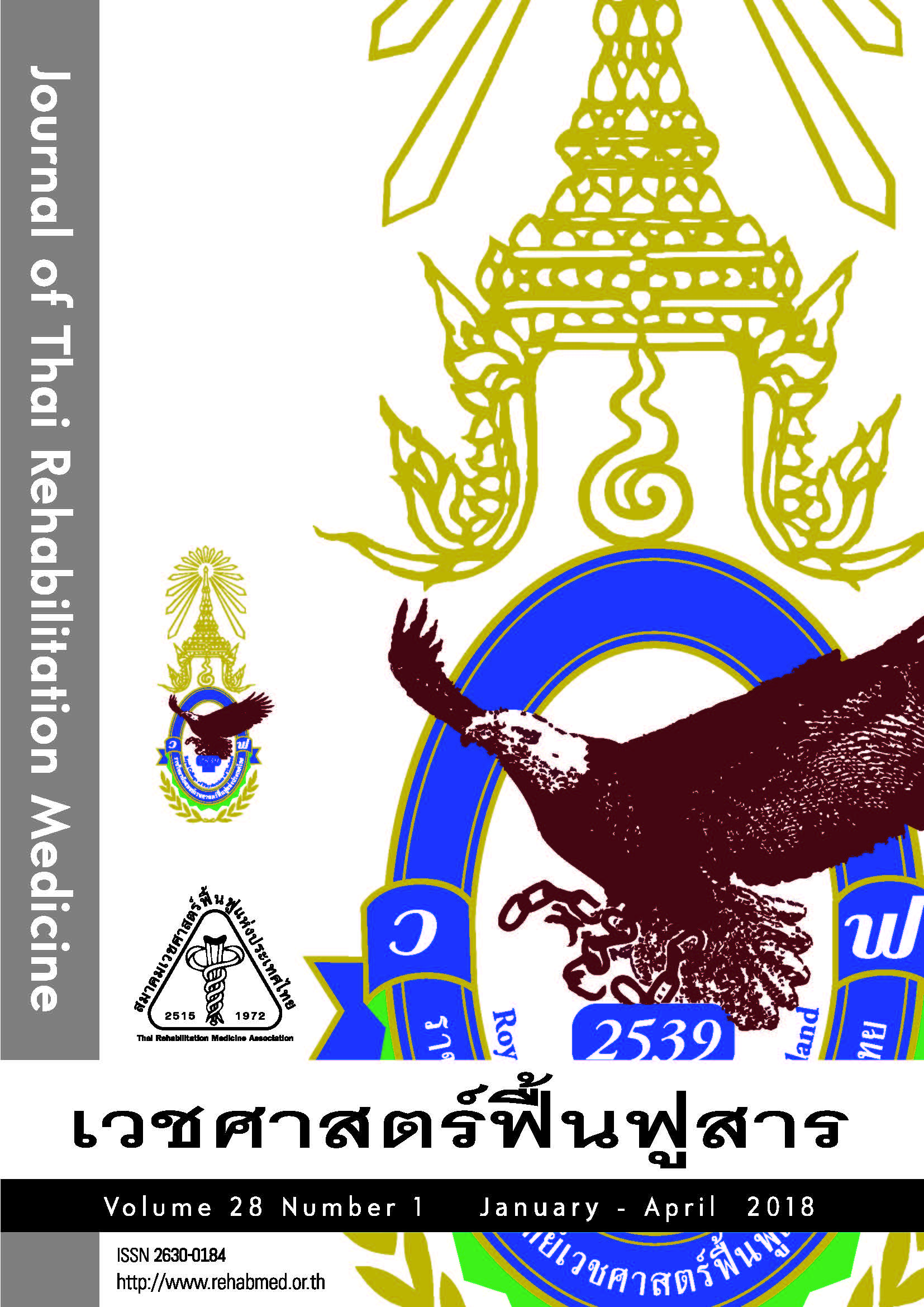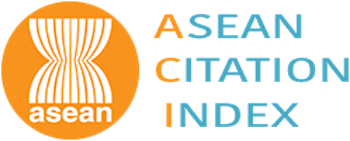ภาระของผู้ดูแลผู้ป่วยโรคหลอดเลือดสมอง 1 ปี หลังจำหน่ายออกจากโรงพยาบาล: การศึกษาสหสถาบัน
ภาระของผู้ดูแลผู้ป่วยโรคหลอดเลือดสมอง 1 ปี หลังจำหน่ายออกจากโรงพยาบาล: การศึกษาสหสถาบัน
Keywords:
caregiver burden, stroke, multivariate, rehabilitation, geriatricAbstract
Objective: To investigate the burden of caregivers at the 1-year follow-up in stroke patients who had received inpatients post-stroke rehabilitation, and to identify factors associated with burden.
Study design: Cross-sectional study
Subjects and setting: One-hundred and sixty stroke patients who were discharged from the rehabilitation wards of nine tertiary care hospitals and their caregivers
Methods: The caregivers were asked to rate the degree of overall burden, and in physical, mental, social, and economic dimensions of burden. Degree of burden was categorized into no burden, slight burden, somewhat burden, moderate burden, and extreme burden. Factors associated with caregiver burden were analyzed using univariate and multivariate analysis.
Results: Mean ± standard deviation age of caregivers was 44.6±13.7 years and 76% were female. Regarding degree of caregiver burden, 30% rated burden of taking care as no burden, 20% slight, 30% somewhat, and 20% moderate to extreme burden. Responses of moderate to extreme burden in the physical and economic dimensions (19.4-20.0%) were more than those in the mental and social dimensions (12.5-16.9%). The only factor significantly associated with burden on caregiver was level of walking ability <10 meters, with an adjusted odds ratio of 3.30 (95% CI: 1.60, 6.83).
Conclusion: Twenty percent of caregivers rated themselves as being moderately to extremely physical and economic burden from taking care of stroke patients. Health policy strategies to effectively relieve caregiver burden should be developed in order to improve the post-stroke experience for both caregiver and patient.
References
2. Hanchaiphiboolkul S, Poungvarin N, Nidhinandana S, Suwanwela NC, Puthkhao P, Towanabut S, et al. Prevalence of stroke and stroke risk factors in Thailand: Thai Epidemiologic Stroke (TES) Study. J Med Assoc Thai 2011;94:427-36.
3. Pai HC, Tsai YC. The effect of cognitive appraisal on quality of life of providers of home care for patients with stroke. J Neurosci Nurs 2016;48:E2-E11.
4. Greenwood N, Pelone F, Hassenkamp AM. General practice based psychosocial interventions for supporting carers of people with dementia or stroke: a systematic review. BMC Fam Pract 2016;17:3.
5. Andrew NE, Kilkenny MF, Naylor R, Purvis T, Cadilhac DA. The relationship between caregiver impacts and the unmet needs of survivors of stroke. Patient Prefer Adherence 2015;9:1065-73.
6. Jeong YG, Jeong YJ, Kim WC, Kim JS. The mediating effect of caregiver burden on the caregivers’ quality of life. J Phys Ther Sci 2015;27:1543-7.
7. Godwin KM, Ostwald SK, Cron SG, Wasserman J. Long-term health-related quality of life of stroke survivors and their spousal caregivers. J Neurosci Nurs 2013;45:147-54.
8. Bakas T, Clark PC, Kelly-Hayes M, King RB, Lutz BJ, Miller EL, et al. Evidence for stroke family caregiver and dyad interventions: a statement for healthcare professionals from the American Heart Association and American Stroke Association. Stroke 2014;45:2836-52.
9. Ganapathy V, Graham GD, DiBonaventura MD, Gillard PJ, Goren A, Zorowitz RD. Caregiver burden, productivity loss, and indirect costs associated with caring for patients with poststroke spasticity. Clin Interv Aging 2015;10:1793-802.
10. Jaracz K, Grabowska-Fudala B, Górna K, Jaracz J, Moczko J, Kozubski W. Burden in caregivers of long-term stroke survivors: Prevalence and determinants at 6 months and 5 years after stroke. Patient Educ Couns 2015;98:1011-6.
11. López-Espuela F, González-Gil T, Jiménez-Gracia MA, Bravo-Fernández S, Amarilla-Donoso J. Impact on quality of life in caregivers of stroke survivors. Enferm Clin 2015;25:49-56
12. Kuptniratsaikul V, Kovindha A, Dajpratham P, Piravej K. Main outcomes of stroke rehabilitation: a multi-centre study in Thailand. J Rehabil Med 2009;41:54-8.
13. Kuptniratsaikul V, Kovindha A, Piravej K, Dajpratham P. First-year outcomes after stroke rehabilitation: A multicenter study in Thailand. ISRN Rehabil 2013;2013:1-6.
14. Kuptniratsaikul V, Kovindha A, Suethanapornkul S, Manimmanakorn N, Archongka Y. Complications during the rehabilitation period in Thai patients with stroke: a multicenter prospective study. Am J Phys Med Rehabil 2009; 88: 92-9.
15. Wade DT, Hewer RL. Functional abilities after stroke: measurement, natural history and prognosis. J Neurol Neurosurg Psychiatry 1987;50:177-82.
16. Nilchaikovit T, Lotrakul M, Phisansuthideth U. Development of Thai version of Hospital Anxiety and Depression Scale in cancer patients. J Psychiatr Assoc Thai 1996, 41:18-30.
17. Mahatnirundrkul S, Tantipiwatanasakul W, Pumpaisalchai W, Wongsuwan K, Promanajirungkul R. Comparison of the WHOQOL-100 and the WHOQOL-BREF (26 items). J Ment Health Thai 1998;5:4-15.
18. Jaracz K, Grabowska-Fudala B, Górna K, Kozubski W. Caregiving burden and its determinants in Polish caregivers of stroke survivors. Arch Med Sci 2014;10:941-50.
19. Watanabe A, Fukuda M, Suzuki M, Kawaguchi T, Habata T, Akutsu T, et al. Factors decreasing caregiver burden to allow patients with cerebrovascular disease to continue in long-term home care. J Stroke Cerebrovasc Dis 2015;24:424-30.
20. Gbiri CA, Olawale OA, Isaac SO. Stroke management: Informal caregivers’ burdens and strians of caring for stroke survivors. Ann Phys Rehabil Med 2015;58:98-103.
21. Olai L, Borgquist L, Svärdsudd K. Life situations and the care burden for stroke patients and their informal caregivers in a prospective cohort study. Ups J Med Sci 2015;120:290-8.
22. Roopchand-Martin S, Creary-Yan S. Level of Caregiver Burden in Jamaican Stroke Caregivers and Relationship between Selected Sociodemographic Variables. West Indian Med J 2014;63:605-9.
23. Zarit SH, Reever KE, Bach-Peterson J. Relatives of the impaired elderly: correlates of feelings of burden. Gerontologist 1980;20:649-55.






